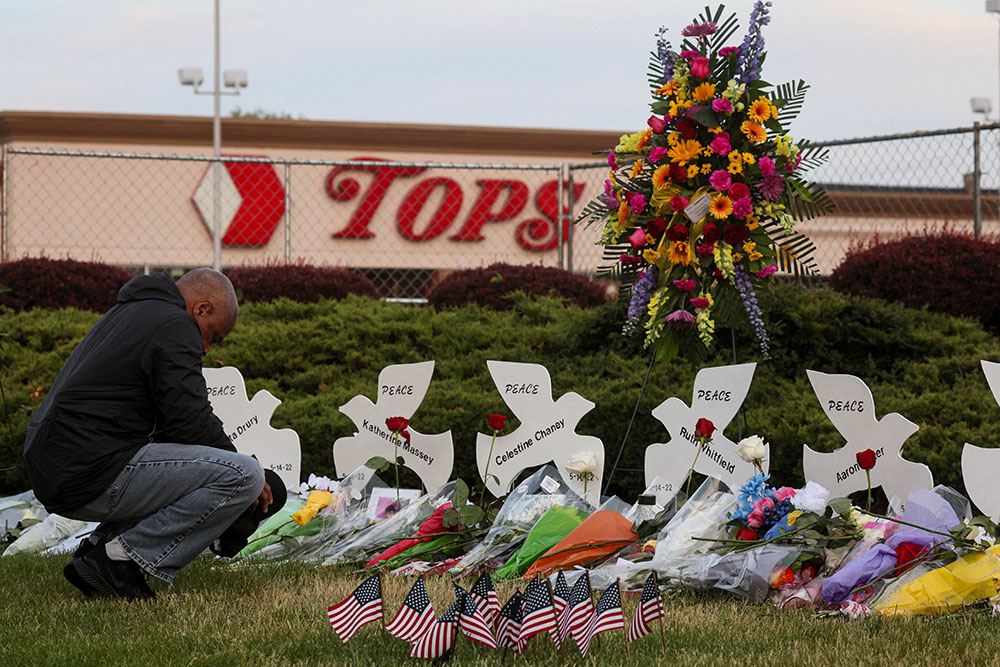
WASHINGTON — Federal prosecutors plan to seek the death penalty for the white gunman who killed 10 black people at a Buffalo, New York, grocery store in 2022.
This is the first new case for which the Justice Department under the Biden administration is pursuing the death penalty.
In a court filing Jan. 12, federal prosecutors said the crimes were “such that, in the event of a conviction, a sentence of death is justified.”
The gunman, Payton Gendron, pleaded guilty in New York state court last year to charges of murder and hate-motivated domestic terrorism in the shootings at the Tops supermarket in a predominantly Black neighborhood of Buffalo and was sentenced to life without parole.
Although New York does not have capital punishment, the Justice Department had the option to seek the death penalty as part of a separate federal hate crimes case.
Court filings about the prosecutors’ decision to seek the death penalty cited the gunman’s extensive planning of the shooting, including the choice of location, which attorneys said was meant to “maximize the number of Black victims.”
In the May 14, 2022, shooting, Gendron shot eight supermarket customers, the store security guard, and a church deacon. Three people who were wounded survived.
After the shooting, several U.S. Catholic bishops expressed their sorrow for what happened and called out racism and gun violence.
“Faith compels us to say no to the rotten forces of racism, no to terror, and no to the mortal silencing of black and brown voices,” said Bishop Mark Seitz of El Paso, Texas, the day after the shooting.
The Associated Press reports that relatives of the victims, ranging in age from 32 to 86, have expressed mixed feelings about federal prosecutors seeking the death penalty.
Mark Talley, whose 63-year-old mother, Geraldine Talley, was killed, told AP he “wasn’t necessarily disappointed” by the decision, even if he would have preferred Gendron spend his life behind bars.
“It would have satisfied me more knowing he would have spent the rest of his life in prison being surrounded by the population of people he tried to kill,” he said.
A joint statement issued by attorneys for some of victims’ relatives said the decision “provides a pathway to both relief and a measure of closure for the victims and their families.”
Federal death penalty cases have been rare since Joe Biden became president. He spoke about ending the practice in his 2020 presidential campaign, but Catholic death penalty opponents such as Sister Helen Prejean, a Sister of St. Joseph, and Catholic Mobilizing Network leaders, have pointed out that he has not taken the steps to make this happen.
Soon after Merrick Garland became U.S. attorney general in 2021, he announced a moratorium on federal executions, pending a review of the department’s policies.
He has allowed prosecutors to move forward with two capital prosecutions authorized during the Trump administration in the cases of Sayfullo Saipov who deliberately rammed his truck into a bike path in Manhattan in 2017, killing eight people, and Robert Bowers, the shooter who killed 11 people at the Tree of Life Synagogue in Pittsburgh in 2018.
Saipov was sentenced to life in prison after the jury failed to reach agreement on the death penalty, and Bowers received a death sentence.
On its website, the Catholic Mobilizing Network points out that Biden is “the first sitting U.S. president to publicly oppose capital punishment — a sharp contrast against his predecessor, President Trump, whose administration carried out an unprecedented execution spree over his last six months in office.”
It points out that despite Biden’s promises on the previous presidential campaign trail, he has “yet to utter a word about capital punishment since taking office. And for many Americans — many Catholics included — the silence is deafening.”
